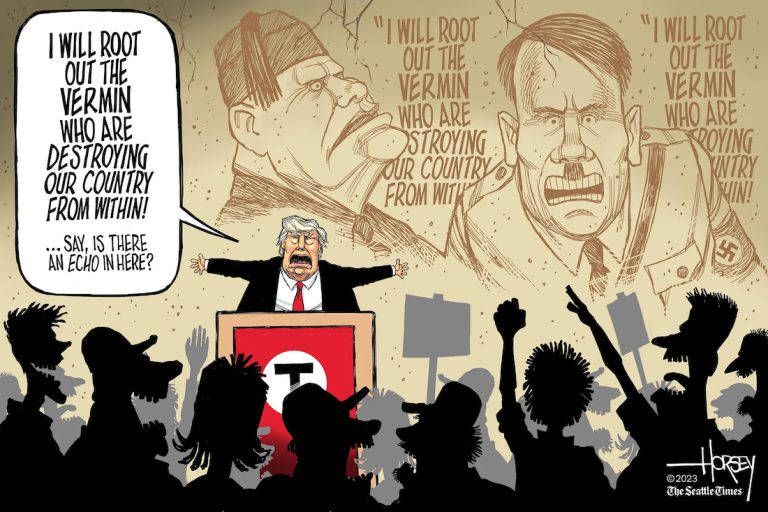
Historians Slam Trump for Dehumanizing “Vermin” Rhetoric

New York, N.Y. – President Donald Trump’s use of the word “vermin” to describe his political opponents has ignited a firestorm of criticism, with historians, ethicists, and lawmakers condemning the rhetoric as dehumanizing and dangerously reminiscent of authoritarian regimes.
The remark, first made at first during a campaign speech in New Hampshire, has further polarized an already divided electorate, raising alarms about the potential consequences of such language in an increasingly volatile political climate.
The controversy over Trump’s language underscores a broader unease about the erosion
of democratic discourse in the U.S. As the 2024 election approaches, the normalization of
such rhetoric could have lasting consequences, leaving many to wonder: How far is too far?
Trump’s “Vermin” Comment Echoes Darkest Chapters in History
During a rally in New Hampshire, Trump vowed to “root out the vermin” in government, a phrase that immediately drew comparisons to the dehumanizing language used by dictators like Hitler and Mussolini. Historians were quick to note that labeling opponents as pests or subhuman has long been a tactic of authoritarian regimes to justify persecution. “This isn’t just hyperbole—it’s a deliberate strategy to delegitimize and vilify,” said Dr. Rebecca Carter, a political historian at Columbia University.
Ethicists Warn of Escalating Political Violence
The use of such inflammatory language, experts argue, normalizes hostility and could incite real-world violence. “When you call people ‘vermin,’ you strip them of their humanity, making it easier for followers to justify aggression,” warned Dr. Alan Weiss, an ethics professor at NYU. The Anti-Defamation League (ADL) and Southern Poverty Law Center have both documented surges in hate speech following Trump’s remarks, raising fears of targeted attacks.

Democrats and Some Republicans Condemn Rhetoric
While Trump’s base cheered the remark, several Republicans joined Democrats in denouncing it. “This kind of language has no place in American politics,” said Senator Mitt Romney (R-Utah). Meanwhile, the Biden campaign seized on the comment, releasing a statement calling it “a grotesque echo of 20th-century fascism.” Even some conservative commentators expressed discomfort, with Fox News’s Bret Baier questioning whether such rhetoric “crosses a dangerous line.”
Trump Defends Comments, Doubles Down
Rather than retreating, Trump has embraced the backlash, posting on Truth Social that “the real vermin are the corrupt politicians destroying our country.” His campaign spokesperson defended the language as “tough talk” against a “corrupt elite.” But critics see a calculated effort to stoke division. “He knows exactly what he’s doing,” said former Trump aide Miles Taylor. “This is about rallying his base by painting opponents as existential threats.”
Trump’s “Vermin” Remark Sparks Outcry, Draws Nazi Comparisons (April 22, 2025)